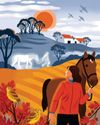يحاول ذهب - حر
SPECTACULAR STONEHENGE FINDS
October 2024
|BBC Countryfile Magazine
Following the latest astonishing revelation about the Stonehenge Altar Stone's Scottish origins, Dixe Wills looks at recent discoveries that have changed the way we view this impressive and enigmatic Neolithic monument
-

Impossibly huge and implausibly ancient, for countless generations Stonehenge has inspired awe in those who have cast eyes upon it. Begun around 3000BC, with additions occurring over the next two millennia, it has become one of the planet's most famous and most puzzling prehistoric constructions.
Although we know that the stones are aligned with the sunrise and sunset at the summer and winter solstice respectively and that burials took place here - the precise motivations of those who built it might never be fully understood.
And just when you think the monument can't get any more bamboozling, Stonehenge tosses out another mystery.
A group of archaeologists writing in Nature magazine recently announced that the monument's Altar Stone is not from the Preseli Hills as previously believed but was quarried in the far north-east of Scotland. It was then transported either by land (over 450 miles) or sea (over 600 miles), all the way to south-west England.
 This astonishing feat has caused academics to reassess the capabilities and organisational nous of our Neolithic forebears. According to University College of London's Mike Parker Pearson, who has been involved in many excavations around Stonehenge, "No other circle [in Britain] was made entirely of distantly sourced stones...
This astonishing feat has caused academics to reassess the capabilities and organisational nous of our Neolithic forebears. According to University College of London's Mike Parker Pearson, who has been involved in many excavations around Stonehenge, "No other circle [in Britain] was made entirely of distantly sourced stones...This has to be one of the biggest clues about its purpose - a monument to unite people on a grand scale." However, this latest discovery is just one of a clutch made about the monument - now in the care of English Heritage (english-heritage.org.uk/ stonehenge) over recent decades.
THE BLUESTONE QUARRY
هذه القصة من طبعة October 2024 من BBC Countryfile Magazine.
اشترك في Magzter GOLD للوصول إلى آلاف القصص المتميزة المنسقة، وأكثر من 9000 مجلة وصحيفة.
هل أنت مشترك بالفعل؟ تسجيل الدخول
المزيد من القصص من BBC Countryfile Magazine

BBC Countryfile Magazine
Manors and meadows
This December marks 250 years since Jane Austen's birth. To celebrate, Jack Watkins ambles around Chawton, where the writer penned novels that changed fiction forever
7 mins
December 2025

BBC Countryfile Magazine
TOP 10 ROYAL RESIDENCES
Castles, palaces and stately homes open a window into the history and private lives of the British monarchy
9 mins
December 2025

BBC Countryfile Magazine
Your countryside
HAVE YOUR SAY ON RURAL ISSUES
1 mins
December 2025

BBC Countryfile Magazine
Community spirit
Rural pubs across Britain are closing at an alarming rate - but local people are fighting back to save inns that have been at the hearts of their villages for centuries. Vivienne Crow orders a pint
4 mins
December 2025

BBC Countryfile Magazine
Gift ideas for nature lovers
Find inspirational and thoughtful presents for all the family in our pick of top outdoor gear and a round-up of this year's best nature and wildlife books
2 mins
December 2025

BBC Countryfile Magazine
Toad numbers are in freefall.It's in our power to save them
After becoming engaged at Christmas in 1998, my new fiancé and I were confronted by an enormous toad on the way to meet the vicar.
2 mins
December 2025

BBC Countryfile Magazine
Conquer fell running
Infamously tough yet famously friendly, the sport of fell running will take your fitness to new heights amid the wildest landscapes. Here's our beginners' guide
3 mins
December 2025

BBC Countryfile Magazine
A glorious haunting
They lived in the same village and shared the same dreams – just 60 years apart.
6 mins
December 2025

BBC Countryfile Magazine
The big questions answered
Across the UK, but particularly in the southeast of England, giant and featureless buildings are springing up.
13 mins
December 2025

BBC Countryfile Magazine
Away in a manger
While most of us down tools and pick up the mince pies, a farmer's work doesn't stop for the festive break.
5 mins
December 2025
Listen
Translate
Change font size
